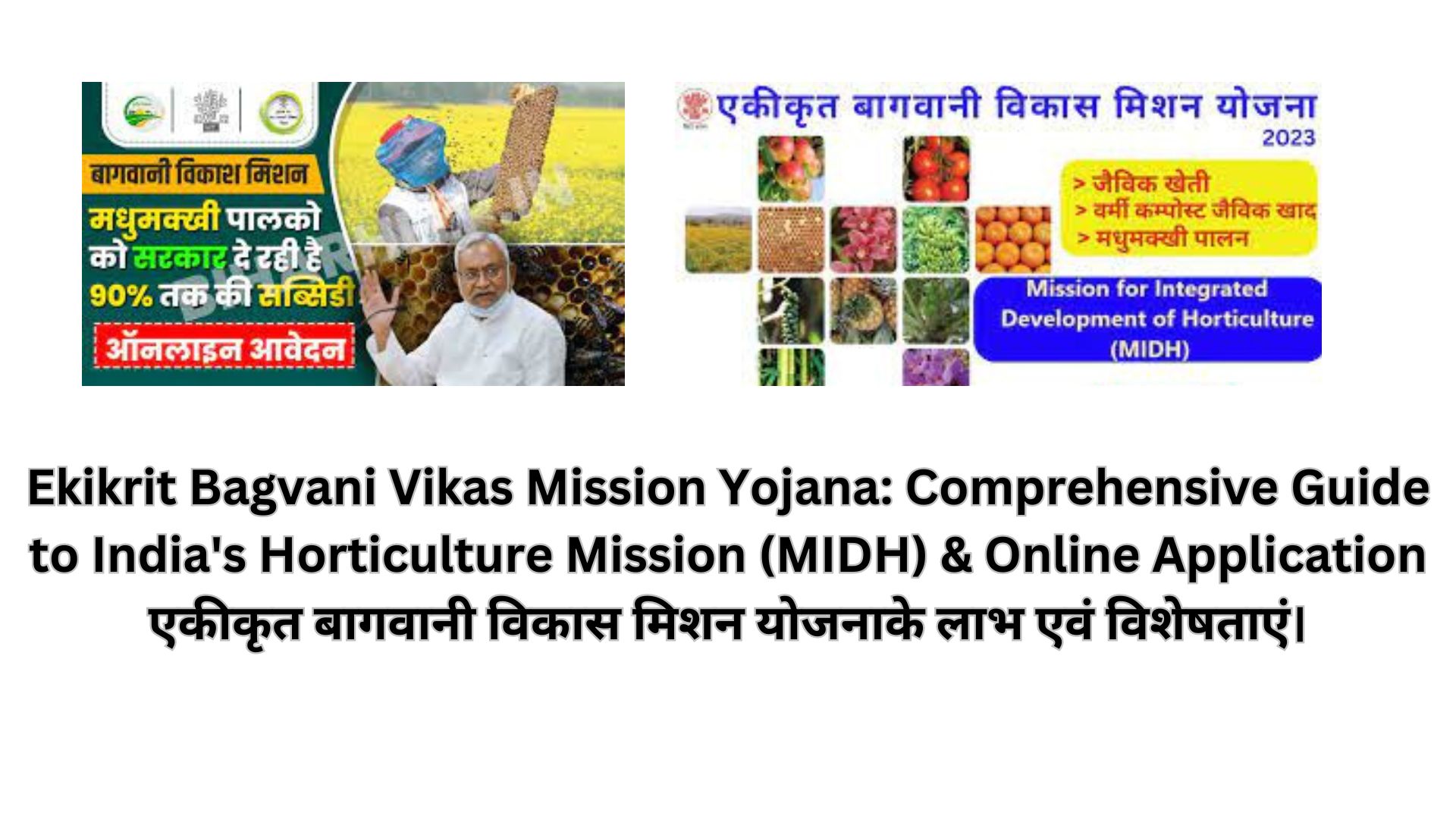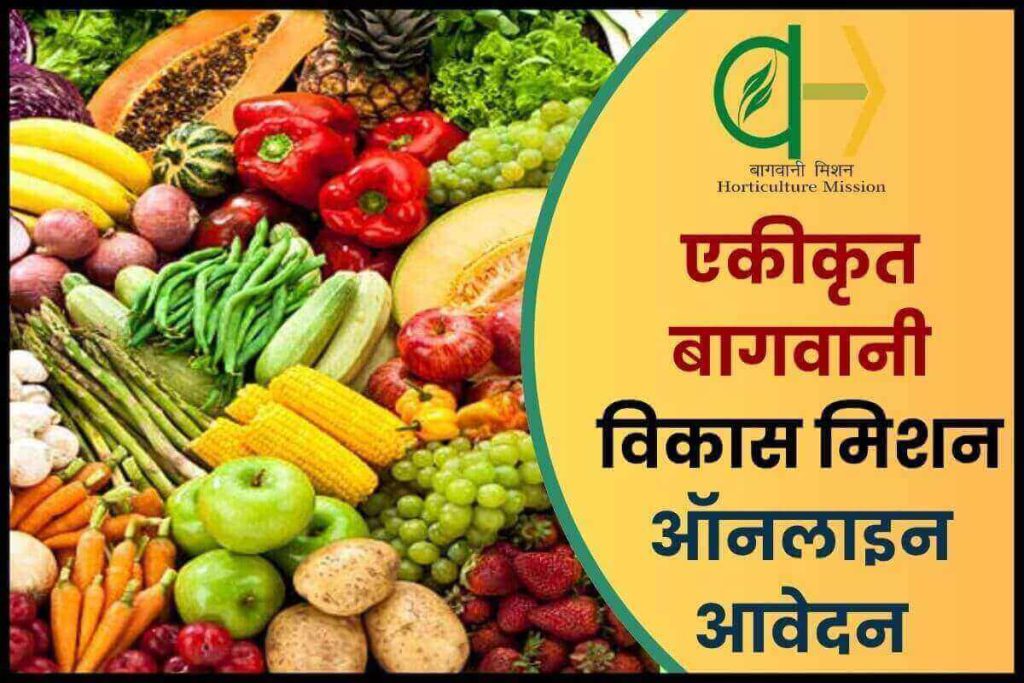
The Indian Government has consistently demonstrated its dedication to strengthening the agricultural sector, implementing various initiatives to improve the well-being of farmers. One noteworthy endeavor is the Ekikrit Bagvani Vikas Mission, specifically focusing on the Integrated Horticulture Development Mission Scheme (MIDH), launched by the Ministry of Agriculture and Farmers Welfare. This article provides an in-depth examination of this comprehensive scheme, encompassing its objectives, advantages, state-wise implementation, and the process for online applications.
Ekikrit Bagvani Vikas Mission Yojana:
The Mission for Integrated Development of Horticulture (MIDH) aka Ekikrit Bagvani Vikas Mission Yojana was inaugurated in April 2014 to foster the cultivation of diverse horticultural crops throughout the country. This centrally funded scheme covers fruits, vegetables, spices, mushrooms, flowers, aromatic plants, and more. Playing a crucial role in supporting farmers, the scheme offers subsidies for the secure storage of produce. The Central Government grants a substantial 85% of the total budget, with the remaining 15% subsidized by state governments.
Bihar’s Agricultural Incentive:
A positive development from Bihar highlights the government’s effort to provide subsidies of up to Rs 30,000 for gooseberry cultivation under the Chief Minister Horticulture Mission Scheme. This subsidy aims to motivate farmers, fostering an increase in horticulture crop production. Interested applicants can apply for these benefits online through the Agriculture Department’s official website, horticulturebihar.gov.in.
Integrated Horticulture Development Mission: Key Objectives:
The primary goal of MIDH is to enhance the production of fruits, vegetables, spices, and various horticultural crops nationwide. The scheme underscores the integration of all horticultural crops into a unified plan, promoting their comprehensive development. Additionally, MIDH seeks to provide grants (subsidies) to farmers for development, research, technology promotion, post-harvest management, and crop distribution.
State Initiatives and Subsidies:
Various states, including Uttar Pradesh and Bihar, actively participate in the Integrated Ekikrit Bagvani Vikas Mission. Uttar Pradesh boasts the establishment of 125 cold storages, while Bihar provides subsidies for pre-cooling units to farmer producer organizations. This collective effort supports the creation of storage facilities and other essential infrastructure.
Online Registration Process:
Farmers interested in benefiting from the Integrated Horticulture Development Mission Scheme can register online through the official website (https://midh.gov.in/). The process involves selecting the respective state, completing the farmer registration form with necessary details, and submitting the information. Upon successful registration, farmers receive a unique beneficiary registration number on their registered mobile numbers.
The Ekikrit Bagvani Vikas Mission Yojana emerges as a catalyst for agricultural growth, transforming the horticulture sector and improving the lives of farmers. With its integrated approach and state-level subsidies, the scheme paves the way for a sustainable and prosperous future in Indian agriculture. Interested farmers are encouraged to explore the benefits and register online, contributing to the nation’s agricultural development.
Unlocking the Potential: Rashtriya Krishi Vikas Yojana I राष्ट्रीय कृषि विकास योजना
Ekikrit Bagvani Vikas Mission Yojana FAQs:
What is the Ekikrit Bagvani Vikas Mission Yojana, and when was it launched?
The Ekikrit Bagvani Vikas Mission Yojana is a comprehensive initiative aimed at developing horticulture, particularly through the Integrated Horticulture Development Mission Scheme (MIDH). It was launched in April 2014.
What does the MIDH scheme cover in terms of crops?
The MIDH scheme covers a wide range of horticultural crops, including fruits, vegetables, spices, mushrooms, flowers, aromatic plants, and more.
How does the MIDH scheme support farmers?
The scheme supports farmers by offering subsidies for the secure storage of their horticultural produce. The Central Government grants a substantial 85% of the total budget, and the remaining 15% is subsidized by state governments.
Can you provide details on Bihar's agricultural incentive for gooseberry cultivation?
The Bihar government is offering subsidies of up to Rs 30,000 for gooseberry cultivation under the Chief Minister Horticulture Mission Scheme. Interested farmers can apply for these benefits online through the Agriculture Department's official website, horticulturebihar.gov.in.
What are the key objectives of the Integrated Horticulture Development Mission (MIDH)?
The primary goals of MIDH include enhancing the production of fruits, vegetables, spices, and various horticultural crops nationwide. It emphasizes the integration of all horticultural crops into a unified plan and provides grants (subsidies) to farmers for various development activities.
Are there any specific initiatives and subsidies mentioned for states like Uttar Pradesh and Bihar?
Yes, various states, including Uttar Pradesh and Bihar, actively participate in the Integrated Ekikrit Bagvani Vikas Mission. Uttar Pradesh reports the establishment of 125 cold storages, and Bihar provides subsidies for pre-cooling units to farmer producer organizations.
How can farmers benefit from the MIDH scheme's online registration process?
Farmers interested in benefiting from the MIDH scheme can register online through the official website (https://midh.gov.in/). The process involves selecting the respective state, completing the farmer registration form with necessary details, and submitting the information. Upon successful registration, farmers receive a unique beneficiary registration number on their registered mobile numbers.
What role does the Ekikrit Bagvani Vikas Mission Yojana play in agricultural growth?
The Ekikrit Bagvani Vikas Mission Yojana serves as a catalyst for agricultural growth, particularly in transforming the horticulture sector. Its integrated approach and state-level subsidies pave the way for a sustainable and prosperous future in Indian agriculture.
Are there specific benefits mentioned for farmers in the MIDH scheme?
Yes, farmers benefit from the MIDH scheme through subsidies for secure storage, grants for development activities, and various state-level incentives, such as Bihar's subsidy for gooseberry cultivation.
How can interested farmers contribute to the nation's agricultural development through this scheme?
Interested farmers are encouraged to explore the benefits of the MIDH scheme and register online through the official website. Their active participation and registration contribute to the overall agricultural development of the nation.

